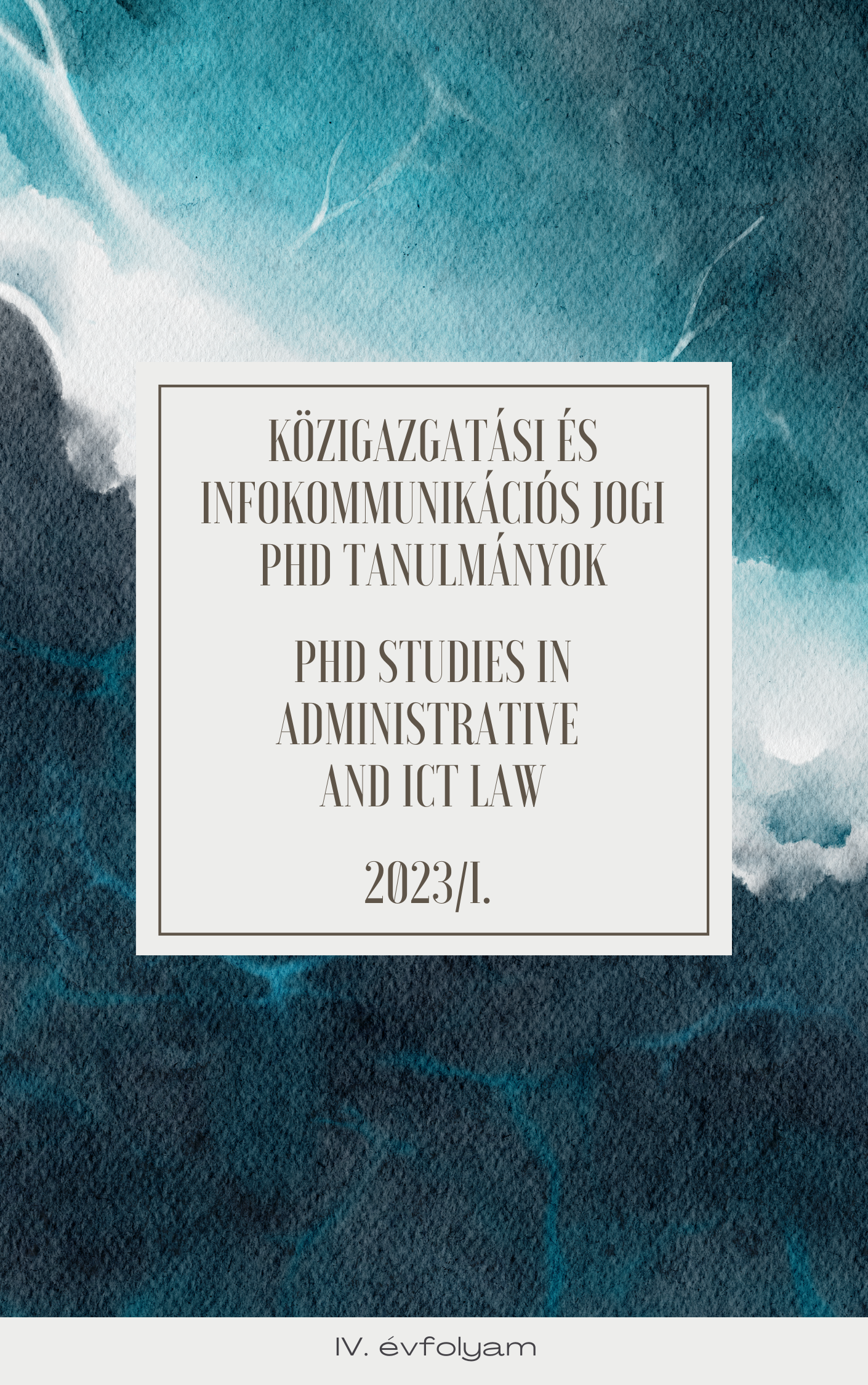Mitigating Aquifer Crisis in Indonesia's New Capital, Nusantara: Problems and Lessons Learned from Singapore
DOI:
https://doi.org/10.47272/KIKPhD.2023.1.1Kulcsszavak:
Nusantara, Water Availability, Water Management, Groundwater, Aquifer CrisisAbsztrakt
Water availability is crucial to every nation’s capital. The appointment of Indonesia’s new capital through Indonesian Law No. 3 Year 2022 poses concerns regarding aquifer crisis as Nusantara is located on top of medium- to low-productivity aquifers. The shift of capital would entail groundwater resources utilization, which pose huge aquifer crisis risks. In contrast, Singapore, a city-state with limited aquifers, sufficiently mitigated aquifer crisis due to its water management policy that could accommodate its citizens’ water demands. In this paper, the authors conducted a comparative analysis on Singapore’s water management policies to provide recommendations on the shift of Indonesia’s capital to fulfill water demands and mitigate aquifer crisis. Using a normative approach, this paper portrays the lessons that can be taken from Singapore in ensuring water availability amidst its limited water resources and high demand of water.
Letöltések
Hivatkozások
Bai, Y., et. al.: Long-term performance and economic evaluation of full-scale MF and RO process – A case study of the changi NEWater Project Phase 2 in Singapore. Water Cycle, 1, 2020. https://doi.org/10.1016/j.watcyc.2020.09.001.
Chua, L. – Eikass, H. S.: The Four National Taps of Singapore: A Holistic Approach to Water Resources Management from Drainage to Drinking Water. Journal of Water Management Modeling, 22, 2014. https://doi.org/10.14796/JWMM.C375.
Devitt, T. J. – Wright, A. M. – Cannatella, D. C. – Hillis, D. M.: Species delimitation in endangered groundwater salamanders: Implications for aquifer management and biodiversity conservation. Proceedings of the National Academy of Sciences, 116(7), 2019 https://doi.org/10.1073/pnas.181501411.
Gordon, J.: On the Road to Independence: The Case of Water Management in Singapore. Ecological Urbanism, 11.308, 2014.
Herlambang, A: Estimation of Groundwater Potential of Penajam Region to Support the Need for Clean Waterin IKN Penajam East Kalimantan. Jurnal Sains dan Teknologi Mitigasi Bencana, 16(2), 2022.
Hindiyeh, M. Y. – Matouq, M. – Eslaiman, S.: Rainwater Harvesting Policy Issues in the MENA Region: Lessons Learned, Challenges, and Sustainable Recommendations in Handbook of Water Harvesting and Consearvation. United Kingdom, John Wiley & Sons, Inc, 2020.
Hohmann, B.: The Principles and Fundamental Requirements of the Transparency on the Public Administrative Proceedings. In: P., Suresh (Eds.): Proceedings of THE IIER. INTERNATIONAL CONFERENCE Dubai, UAE. Dubai, International Institute of Engineers and Researchers (IIER), 2019
Khanlari, G., et al.: The effect of groundwater overexploitation on land subsidence and sinkhole occurrences, West of Iran. Quarterly Journal of Engineering Geology and Hydrogeology, 45(4), 2012. https://doi.org/10.1144/qjegh2010-069
Lafforgue, M. – Lenouvel, V.: Closing the urban water loop: lessons from Singapore and Windhoek. Environmental Science Water Research & Technology, 1(5), 2015.https://doi.org/10.1039/c5ew00056d.
Malmir, M., et al.: Integrated groundwater management using a comprehensive conceptual framework. Journal of Hydrology, 605, 2022. https://doi.org/10.1016/j.jhydrol.2021.127363.
Octastefani, T. – Kusuma, B. M. A.: Water Governance of Singapore in Achieving Sustainable Water Security. Jurnal Pembangunan dan Alam Lestari, 7(1), 2016.
Onodera, S., et al.: Effects of intensive urbanization on the intrusion of shallow groundwater into deep groundwater: Examples from Bangkok and Jakarta. Science of the Total Environment, 404(2-3), 2008. https://doi.org/10.1016/j.scitotenv.2008.08.003.
Rofil, Maryono: Potensi dan Multifungsi Rainwater Harvesting (Pemanenan Air Hujan) di Sekolah bagi Infrastruktur Perkotaan. Biology Education Conference Proceeding, 14(1), 2017.
Sanlath, C. & Masila, N. M.: Water demand management: What lessons can be learned from Singapore’s water conservation policy? Water Utility Journal, 26(1), 2020, pp. 1-8.
Saparuddin: Rintisan Menuju Kemandirian Air Minum Masyarakat Desa di Sulawesi Tengah. Jurnal SMARTek, 3(3), 2005.
Theresia, Sihombing, R. M. – Simanungkalit, F: The Impact of Indonesia Capital Relocation to Kalimantan Peatland Restoration. Sociae Polites, 21(2), 2020. https://doi.org/10.33541/sp.v21i3.2262.
Tim Pusat Studi Gempa Nasional: Peta Sumber dan Bahaya Gempa Indonesia Tahun 2017. Indonesia, Badan Penelitian dan Pengembangan Kementerian Pekerjaan Umum dan Perumahan Rakyat, 2017. ISBN: 978-602-5489-01-3.
Tortajada C. – Joshi, Y.K.: Water Demand Management in Singapore: Involving the Public. Water Resources Management, 27(8), 2013. https://doi.org/10.1007/s11269-013-0312-5.
Uc-Castillo, J. L., et al.: A systematic review and meta-analysis of groundwater level forecasting with machine learning techniques: Current status and future directions. Environmental Modelling & Software, 168, 2023. https://doi.org/10.1016/j.envsoft.2023.10578.
Van, C. P., Brye, B. – Deleersnijder, E., Hoitink, A. J. F., Sassi, M., Spinewine, B., Hidayat, H., Soarez-Frazão, S. Simulations of the flow in the Mahakam river–lake–delta system, Indonesia. Environmental Fluid Mechanics, 16, 2016. https://doi.org/10.1007/s10652-016-9445-4.
Viorence, E. et al: Analisis Tingkat Pencemaran Air PAM di Desa Meurandeh. GRAVITASI Jurnal Pendidikan Fisika dan Sains, 5(1), 2022.
Downloads
Megjelent
Verziók
- 2023-10-31 (2)
- 2023-10-31 (1)
Hogyan kell idézni
Folyóirat szám
Rovat
License
Copyright (c) 2023 Közigazgatási és Infokommunikációs Jogi PhD Tanulmányok

This work is licensed under a Creative Commons Attribution-NonCommercial-ShareAlike 4.0 International License.
A cikk felhasználási jogaira bármely harmadik fél számára az első közzétételt követően a Creative Commons Attribution-NonCommercial-ShareAlike 4.0 (CC-BY-NC-SA 4.0) licenc feltételek az irányadók.
Accepted 2023-10-06
Published 2023-10-31














